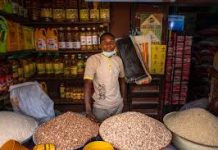The National Agency for Food and Drug Administration and Control (NAFDAC) and Nigeria Agricultural Quarantine Service (NAQS) have disagreed on the use of methyl bromide for crop pest control in Nigeria.
NAFDAC had issued warning to the effect that the agro-chemical, methyl bromide, has been phased out and its use in Nigeria is now prohibited because of the impact of the substance on climate change, particularly the depletion of the ozone layer.
However, NAQS, an agency under the supervision of the Federal Ministry of Agricultural and Rural Development, yesterday insisted that the use of methyl bromide is still permissible in Nigeria.
A statement by Dr. Chigozie Nwodo, Head of Media, Communications and Strategies of NAQS, said the Agency is the statutory agricultural quarantine authority in Nigeria.
“It is mandated to promote and regulate sanitary and phytosanitary measures in order to minimise the risk to agricultural economy, food safety and the environment.
“It is within the sole purview of NAQS to make pronouncements on the permissibility or otherwise of the use of methyl bromide and other agro-chemicals for the phytosanitary treatment of agro-commodities.
“Furthermore, NAQS is the National Plant Protection Organisation (NIPPO) for Nigeria under the International Plant Protection (IPPC) guidelines.
“The Agency is thus responsible for ensuring that Nigeria conforms to all relevant international protocols on agro-commodities that are consistent with the overall interest of the Nigerian agricultural economy.
“Consequently, farmers are advised that the healthy use of methyl bromide for control of agricultural pest remains permissible in Nigeria especially for export of Hibiscus to Mexico.”
Nwodo said the warning issued by NAFDAC had caused panic among farmers and exporters who rely on Methyl bromide as potent option for the control of certain agricultural pests.
According to him, “In the interest of clarity, “Methyl bromide is a widely used gas fumigant for the control of insect pests, termites, rodents, weeds and some soil borne diseases.
“Whereas the use of methyl bromide is known to have some deleterious effect on the environment, it is acceptable for controlled quarantine use because of the lack of comparably efficacious alternatives.
“For example, under the International Standard for Phytosanitary Measures (ISPM) 15, the use of Methyl bromide for the treatment of wood packaging in international trade is allowed.”
“More so, the use of methyl bromide is sometimes set as a precondition for the treatment of agro-commodities intended for export.
“Some destination countries specifically request for its use in the fumigation of a number of agricultural produce meant for export to their market.
“A case in point: Mexico, as a nation, explicitly requested that all Hibiscus shipments from Nigeria to their country must be treated with Methyl bromide.
“This is a clear and categorical pre-condition for the export of Nigerian Hibiscus to Mexico.
“It is worthy to note that healthy compliance with that prerequisite enabled Nigeria to earn over $35 million in foreign exchange in the seven months of 2017 alone.
“For the avoidance of doubt, all agro-chemicals are potentially harmful; if used contrary to their original purpose or if applied arbitrarily.
“This is the reason NAQS advocates the use of agro-chemicals according to the appropriate product specification.”
Nwodo noted that any possible announcement of a change in the regime of the use of methyl bromide for agricultural pest control in the future would emanate from NAQS.














